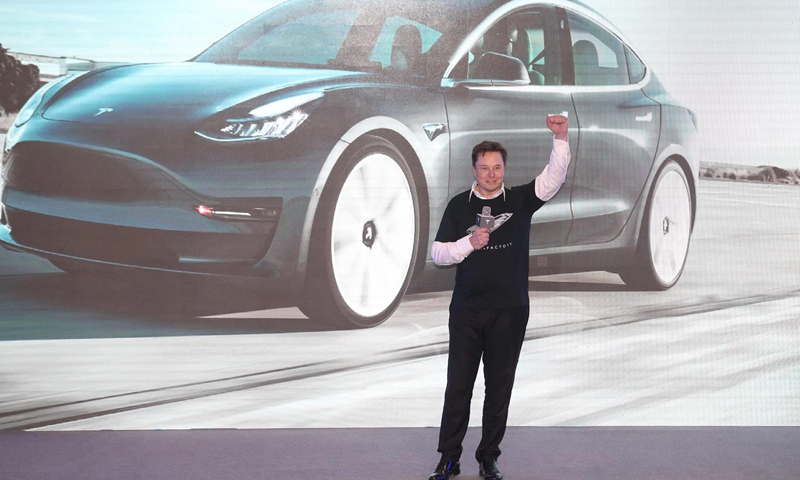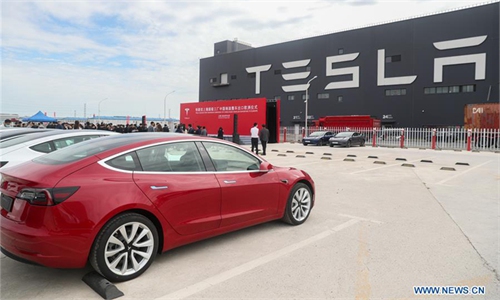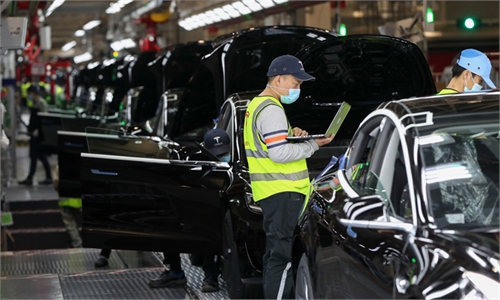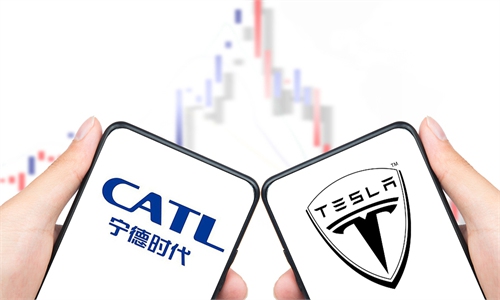
SpaceX owner and Tesla CEO Elon Musk gestures at a launch event at Shanghai gigafactory in January 2020. Photo: cnsphoto
Despite supply-chain challenges, Tesla reported a record second quarter profit on Monday, which, to a certain extent, underscores the growing contribution of China's manufacturing strength to its bottom line.
The US-based automaker's revenue nearly doubled from a year ago to $12 billion during the three months ended June. The company registered a net profit of $1.14 billion for the quarter, nearly 10 times the net profit during the same period last year.
Tesla's strong performance was achieved largely based on the support of its Shanghai Gigafactory. During the second quarter, Tesla sold 92,463 cars in China and exported more than 30,000 Shanghai-made vehicles, according to the China Passenger Car Association. Meanwhile, it reportedly delivered more than 200,000 cars globally. Apparently, the output of its Shanghai Gigafactory is the main driver behind its record performance.
Tesla is not the only foreign automaker benefiting from China's manufacturing strength. In fact, the world's leading carmakers are now all involved in developing electric cars in China. Daimler and Toyota established joint ventures with Chinese manufacturers to build electric cars, while Volkswagen has been building its third Chinese factory aimed at producing electric cars.
While there have been voices hyping up a so-called supply-chain shift out of China, the appeal of the Chinese new energy vehicle sector indicates that the country still has unique comparative advantages in global manufacturing competition, which has been evolving to include factors such as a huge market, comprehensive industrial system, sound infrastructure foundation, and R&D capability.
The resilience of Chinese supply chains has enabled companies like Tesla to maintain agile production even amid the global pandemic, while the Chinese government has offered great incentives to facilitate the industry's development.
Nevertheless, it is important to note that governments around the world have attached great importance to the development of the electric car industry, especially in view of the goals of reducing carbon emissions. Therefore, global race over the industrial chain is becoming increasingly fierce.
For instance, Germany is vigorously promoting the development of a local electric car industry; in the US, tax breaks and other measures raised by the Biden administration is expected to lift the country's share of electric car sales in the coming years.
It should also be pointed out that despite the relatively large production capacity, China's electric car sector doesn't have an obvious technical advantage. While Tesla managed to minimize the impact of the global chip shortage by substituting alternative chips and developing software for them, some other manufacturers had to suspend production due to the lack of domestic supplies. Moreover, the race on battery technology has also been heating up globally.
In this sense, China needs to think about how to achieve technological breakthroughs to keep its manufacturing competitive.



